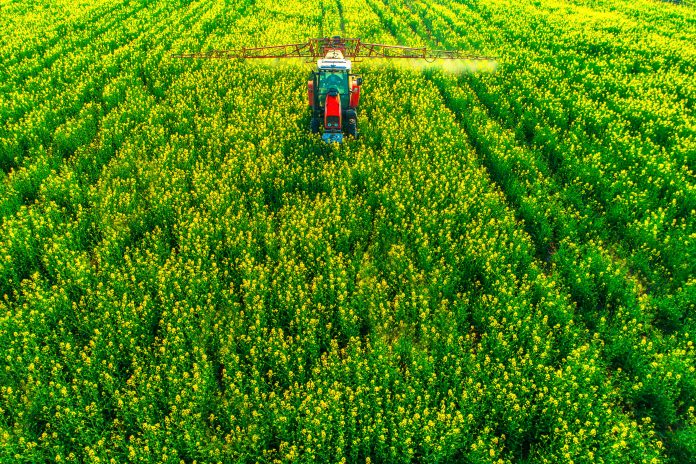The government has launched a new strategy to clean up our air – which includes a commitment to support farmers’ efforts to tackle air pollution
Agriculture is responsible for 88% of UK emissions of ammonia gas which can travel long distances, be damaging to the environment, and combine with other pollutants to form fine Particulate Matter (PM) pollution, which is harmful to human health.
The measures set out in the Clean Air Strategy will help cut the costs of air pollution to society by £1.7 billion every year by 2020, rising to £5.3 billion every year from 2030.
Farming Minister, George Eustice said:
“Ammonia emissions can have a significant impact on the environment and on our health, and as custodians of the land, farmers have an important role to play in reducing them.
Under the new strategy, the government will provide farmers with support to invest in infrastructure and equipment to reduce emissions and will work with industry to encourage low emission, holistic farming techniques.
Funding has been available through the Countryside Productivity Scheme to help farmers purchase manure management equipment including low-emission spreaders and the scheme is due to run again in 2019. Funding is also available through the Countryside Stewardship Scheme for slurry tank and lagoon covers for farmers in priority water catchments.
In September 2018 the government launched a new £3 million programme through the Catchment Sensitive Farming (CSF) partnership to fund a team of specialists who work with farmers and landowners in priority areas to provide training events, tailored advice, individual farm visits and support with grant applications.
Our Agriculture Bill already sets out how future financial support for the farming sector will be focussed on delivering improvements to the environment. We propose that a future environmental land management system should fund targeted action to protect habitats impacted by ammonia. Natural England is already examining options to improve the effectiveness of schemes for mitigating ammonia emissions in protecting these habitats.”
Marian Spain, Natural England Interim Chief Executive said:
“Natural England has a team of experts poised to support farmers to take action which will help improve our environment and safeguard our precious natural habitats from the damaging effects of nitrogen pollution.
We are committed to making sure that future agriculture schemes mean farmers businesses can work in harmony with the natural environment and ensure wildlife can be enjoyed by future generations. And Natural England teams are already, through the Catchment Sensitive Farming programme, working on the ground providing essential advice and guidance to farmers to tackle pollution to water, land and the air.
With partners, Natural England will be running a series of farm demonstration events in February and March to show what can be done to reduce ammonia emissions. Free training and advice will be available to help support farmers to, for example, make choices about investment in infrastructure and equipment to reduce emissions.”
Jenifer Baxter, Head of Engineering at the Institution of Mechanical Engineers, responds to the Government’s Clean Air Strategy 2019 from the perspective of a different industry:
“The Government’s Clean Air Strategy is a missed opportunity to provide greater clarity on how monitoring equipment and systems could be developed in order to inform decision making. With just 271 air quality monitoring stations throughout the UK, this strategy was an opportunity to improve our understanding of emissions, both across different sectors and the UK, and air pollution’s role in contributing to nearly 40,000 early deaths a year.
“We need legally binding commitments, particularly for transport and energy systems, that could help improve the quality of the air we breathe across the UK. Local authorities have already been given responsibility for tackling roadside nitrogen dioxide concentrations, but we need to be making a determined effort to deal with transport emissions more broadly.
“We called for a Clean Air Act in our A Breath of Fresh Air report, where we outlined our need for coherent and consistent monitoring of transport emissions, so informed targets can be set. We recommended incentives for freight deliveries outside peak hours and highlighted the potential to retrofit diesel trains to cut emissions while trains are standing at platforms.
“The Institution went further in our Energy from Gas report, and identified the possibilities for hydrogen that can be used in all areas of our energy system producing a low particulate and low greenhouse gas emissions fuel for transport, reducing the CO2 emissions from our heating systems, reused to generate electricity as well as providing a greener feedstock for industries such as ammonia and plastics production.
“Monitoring the UK’s emissions more effectively would provide better evidence and help us decide on the best solutions for our communities. In particular, we would like to see the Department for Environment, Food & Rural Affairs work with the Department for Transport to introduce emission monitoring equipment across our transport network (e.g. in streets, underground stations, enclosed railway stations, ports, airports) along with real-time on-vehicle monitoring.”
Full details of the measures which will be introduced to reduce emissions from farming can be found in the strategy document.











